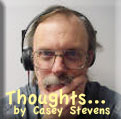- By Casey Stevens
- Opinions
 Print
Print  My attention seems drawn in several directions this week. It looks like things are gradually loosening, though with well deserved trepidation on the part of many. Our fears seem well grounded, but I'm beginning to resent the media's tendency or intention to stoke irrational fears, even as many of the newscasters are beginning to sound bored.
My attention seems drawn in several directions this week. It looks like things are gradually loosening, though with well deserved trepidation on the part of many. Our fears seem well grounded, but I'm beginning to resent the media's tendency or intention to stoke irrational fears, even as many of the newscasters are beginning to sound bored.E.B. White, a veteran of Cornell and The New Yorker of days past, seemed to predict the boredom of repetition of disaster-driven news with his description of hurricane Edna in 1954. In a nutshell, he wrote of the news reports on radio as starting almost forty-eight hours ahead of time and how the same news was repeated almost ad nauseum while little was actually happening, at least in his neck of the woods. Reporters on windy beaches and predictions of doom seemed intended to keep the listeners glued to the radio, whether they were in the path of the storm or not. All the other news of the world took a back seat to the hurricane.
I suppose it could be argued that the pandemic of 2020 should push all 'other' news to the back pages. But a danger lies in pushing this to an extreme: either people will get bored (a distinct possibility, you must admit) or angry (that's already happening) or abysmally fearful. All three are potentially dangerous, and I would argue are three sides of the die that is cast daily, almost hourly. These three horsemen – boredom, fear, and anger – bode ill for our fragile social fabric, especially in a fateful presidential election year.
The phrase 'social fabric' was touched upon by one of my newfound critical commentators, who writes by the name of Janan Ganesh in the Financial Times.
He speaks of the armed militia at the Michigan legislature, gym regulars protesting in Florida by doing group push-ups in front of their closed gyms, and Elon Musk reopening the Tesla plant amid protests in California.
Ganesh writes: "If impatience to resume normal life builds as spring becomes summer, the past few days will be remembered as the inflexion point." But he goes on to state: "As the shutdown eases, it is natural to anticipate better days, but in one sense, the shutdown was a test of the social fabric's tensile strength. The cloth is still in one piece."
Well, I agree. I think there is still great potential for us, as a bunch of wounded and worried humans, to come out of this stronger as a nation and to find a more understanding and supportive world post-pandemic. The talk of 'not canceled', the outpouring of appreciation and simple love for our medical caregivers, the potential for families to rediscover dinnertime, game night, and interpersonal communication all point in a positive direction, for we two-legged ape-persons. But you have to admit, the potential for disaster, both short- and long-term, is under our noses, before our eyes, and poking its head into our tents and psyche.
Police agencies are reporting increased domestic violence, in conjunction with a decrease in child abuse calls because reports usually come from school. Couple this with the real probability of increased alcohol usage in the locked-down home and the potential for financial crisis increase as the slow ascent back to 'business as usual' begins with speed too slow for some, too fast for some, too fraught with questions for all.
Yes, I'm worried. Though I have a perennial tendency to see dystopia as my 'personal normal', I think we need to look around critically and attempt to bravely assess the newly damaged world we have survived. Yes, survived. This has been a life-threatening, as well as a life-assuring experience. You have changed, your neighbor has changed, our children have changed. Eventually, we will only see the past through jaundiced memory, though we must also see it with newly appreciative and more generous hearts.
Skittish, suspicious, and sentimental we will be. Hopefully, we will become a little less cynical, a little less myopic, more discerning, and optimistically, more empathetic with our fellow travelers.
The 'social fabric' is taut but not torn, yet. It depends, I surmise, on how we handle 'the rest of the story', as Paul Harvey said. Today, we can begin again. Be strong, warrior. Take care of each other.
v16i21
